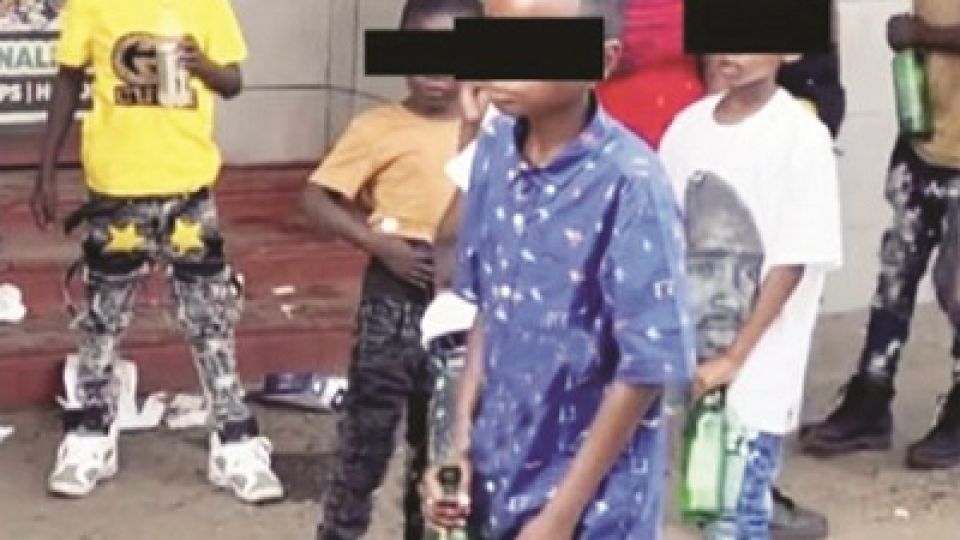from MARCUS MUSHONGA in Harare, Zimbabwe
Zimbabwe Bureau
HARARE, (CAJ News) – ALCOHOL abuse, especially during the merry-making season, is not peculiar to Zimbabwe.
But, images of youngsters, some of not school-going age consuming it in public during the period has sent shockwaves in a country battling an emerging problem of addiction as its problems worsen by the day.
Incidents of children, some aged as young as five, abusing alcohol, is an indicator how Zimbabwe has degenerated from being Africa’s moral compass into the abyss.
This breakdown of law and order witnessed during the festive period adds to the numerous crises that the beleaguered government must address. This as the economic, political and social woes spiral out of control.
On Boxing Day, December 26, a video circulated on various social media platforms showing minors drinking in Harare’s central business district.
Assistant Commissioner Paul Nyathi, the Zimbabwe Republic Police (ZRP), revealed the children in the circulating video are aged five, seven (three of them), nine, 10 (three) and 11 years.
They all reportedly reside at Nenyere Flats in the oldest township in Zimbabwe, Mbare. They stay with their parents and guardians who have since been located by the police.
Initially, police said some of these minors were street kids but the enforcers have since dismissed this version.
ZRP reported that the minors, said to have received the money from parents and guardians as Christmas presents, travelled from Mbare to Harare CBD and linked up with two other minors from the other high density suburb, Epworth, southeast of Harare.
Police have arrested a 23-year-old man, Phaeteon Mutiyaya, accused of providing alcohol to the minors on Christmas Day.
The suspect allegedly operates a shebeen at the Nenyere Flats in the capital.
“The police will arrest violators of the Liquor Act without fear or favour. Operators of shebeens or illegal liquor outlets will face the full wrath of the law,” Nyathi warned.
Police then issued a stern warning to alcohol outlet operators against supplying or selling liquor to persons under the age of 18.
However, it appears the warning was not a deterrent.
No sooner was the order given than after New Year’s Day, social media videos went viral again, showing some very young girls drinking beer at a shopping centre in Juru in the Goromonzi area of Mashonaland East province, southeast of Harare.
Some of the minors seem to be of pre-school age.
The ZRP has identified and located the six young girls and one boy.
Nyathi said their parents and guardians had also been located.
Nyathi said the police’s Victim Friendly Unit was counselling the minors in consultation with relevant government departments.
Apparently, these two incidents are a tip of the iceberg.
An elder revealed how he witnessed similar skirmishes by extremely under-aged kids in Luveve, one of the oldest townships in the second capital Bulawayo.
“The society has failed our children,” the elder lamented.
Reports have also emerged of kids drowning themselves in alcohol in shebeens littering the Majubheki area of Mbare.
Neville Mavu, the Child President of Zimbabwe’s Junior Parliament, bemoaned the trend.
“This irresponsible behaviour not only violates the law but also poses serious risks to these vulnerable children,” Mavu said.
Already, police are battling youth participating in so-called vuzu parties where youth, mostly teenagers, engage in excessive beer drinking, drug abuse and sex orgies.
These are most famous in Bulawayo. Youngsters left in charge of households after their parents left the country for greener pastures organise these wild parties.
The government led by the Zimbabwe African National Union-Patriotic Front (ZANU-PF) has been blamed for the demise of a country that at independence from Britain in 1980 was hoisted as the jewel of Africa.
Sanctions by Western nations have added to the woes, much to the detriment of the family structure and the education sector in a country that in its heyday had the highest literacy rates in Africa.
Rampant poverty, affecting 70 percent of the population of 16 million, has been identified as a risk factor for substance use in Zimbabwe.
The Southern African country launched the Zimbabwe National Drug Master Plan (2020–2025) with the aim to provide a comprehensive and integrated approach to address the rise in substance use.
– CAJ News

